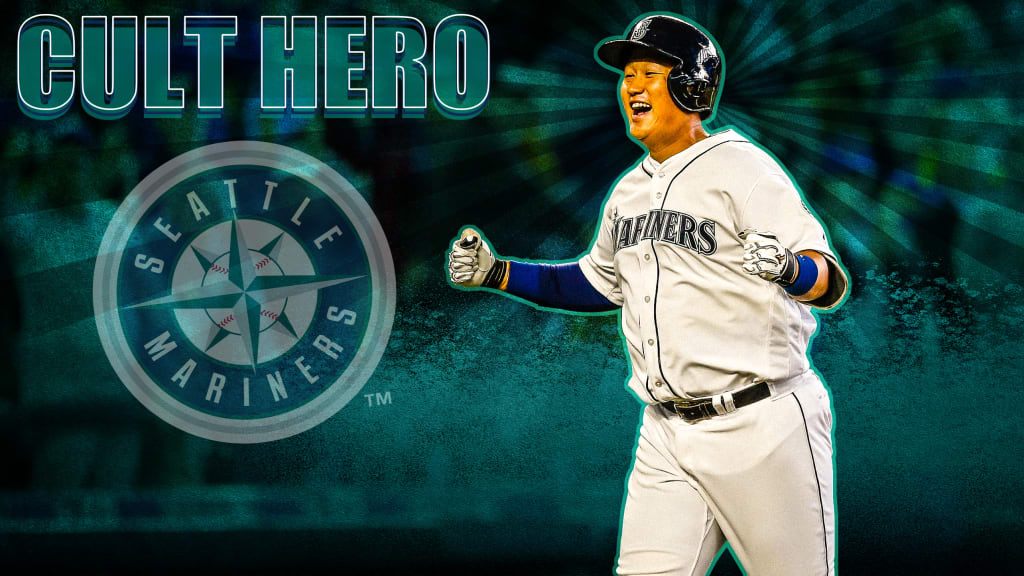
SEATTLE -- He arrived in Seattle with a bang. Or a home run, more precisely. He won several games with mammoth blasts, had Mariners fans singing his name -- or at least a Jamaican musical version -- every time he came to the plate. And then he disappeared, back to where he began as a legend in his homeland of Korea.
The Dae-Ho Lee era with the Mariners was brief. But the big man from Busan, South Korea, made his mark, denting a few baseballs, creating laughs and lifetime friends and leaving lasting memories with those he met in his lone season in Major League Baseball in 2016.
Maybe it was the catchy “Day-O” song, the old Harry Belafonte lyrics, that fans echoed every time it came over the loudspeakers as his walk-up music. Maybe it was his “every-man” look, at least if every man stands 6-foot-3 and is listed at a very generous 250 pounds. Or maybe it was just the fact his first MLB hit was a home run in Seattle’s home opener against the A’s, and that he brought the threat of big-time power to the plate with every ensuing appearance.
“I would say of all the players we’ve had since I’ve been with the Mariners, for a guy who only spent a year with us, he left the most positive mark on everyone,” said general manager Jerry Dipoto, who has seen plenty of athletes come and go through his five seasons in Seattle.
Lee came to the Mariners as a 34-year-old on a Minor League deal. He was looking to prove to himself that he could make it in the Majors after 11 seasons in Korea and four in Japan. He had to win a job in Spring Training, and he did so by earning a platoon berth with Adam Lind at first base, then made the most of his early opportunities.
Four of his first nine hits were homers, including a 10th-inning walkoff blast off Jake Diekman to beat the Rangers in the final game of the opening homestand and a two-homer game in a 9-8 win in Oakland in early May. By mid-June he was batting .308 with 10 homers and 24 RBIs in 110 plate appearances and fans were clamoring for more.
Not all stories have perfect endings, however, as MLB pitchers and scouting departments began learning Lee’s limitations. A slow bat that had trouble catching up to high heat and his difficulty against right-handed hurlers, combined with a bone bruise in his left hand, resulted in the big slugger batting .223 with four homers and 25 RBIs in 207 plate appearances over his final 3 1/2 months.
But Lee’s impact on the Mariners was felt beyond the diamond. He lived life large and -- despite his limited English – became a popular figure in the clubhouse on a team that featured players from eight different countries.
“He’s one of the funniest players I’ve ever had the opportunity to manage,” said Scott Servais, who started in Seattle the same season that Lee landed on the roster. “Just where he was at in his career, the whole process, making the team, hitting that big homer off Diekman, how he embraced his teammates. He was huge in the card games on the plane. He’d lose all the time, but he just loved playing.”
The Mariners went 86-76 that season, just missing an American League Wild Card berth, and Lee cherished being a part of it.
“In one of the most diverse clubhouses of all time, he quietly may have been the biggest character of them all,” Dipoto said. “It was a fun year for us in general, and he and Leonys Martin really stand out to me as having been the center of what was a good-time vibe that truly lasted all year, right up 'til the last weekend.”
When the Mariners held their dress-up day flight and Servais asked players to wear outfits that conveyed a message about who they were and where they were from, Lee got on the plane wearing a giant kimono. Later in the year, when Lee wanted to express appreciation to his teammates, he ordered individualized sunglasses from a company he owns in Korea, each pair customized with the player's name and a design he felt fit his personality.
While the sun set quickly on Lee’s time in Seattle, he wasn’t done playing baseball. Uncertain of his future in MLB and wanting to play full time, he signed a reported four-year, $12.9 million deal to return to the Lotte Giants that made him the highest-paid player in the Korean Baseball Organization.
Lee hit .327 with 71 home runs and 236 RBIs (286 games) in his first two seasons back in Korea before slipping to .285 with 16 homers and 88 RBIs in 135 games this past year at age 37. Lee remains large in his homeland and is the president of the KBO’s players association.
Mariners international scout Ted Heid said Lee’s popularity in Korea approaches how Ichiro Suzuki is revered in Japan.
“He obviously hasn’t performed like Ichiro did at the highest level, but he’s probably the most recognizable player ever in the KBO,” Heid said. “He’s the player that crosses over for other teams’ fans. Everybody is a fan of Dae-Ho Lee, even if you’re from a rival club. Everybody cheers for him.”
Or as Dipoto says: “Dae-Ho is roughly Babe Ruth in the KBO.”
That comparison includes Lee’s large appetite and love for life. During Mariners games, he quickly learned there was a soft-serve ice cream machine in the players’ dining room and would sneak back into the clubhouse every inning or two to help fuel his mid-game energy with sugar.
Postgame, he and his interpreter, D.J. Park, would regularly head to a Korean restaurant in Bellevue, Wash., that stayed open late for them. Lee was one of the rare players who actually gained weight during the lengthy baseball season. But his zest for food and fun was part of his charm.
“I remember one off-day we flew into Oakland early in the season and I wanted to go to dinner with him,” Servais recalled. “D.J. and Dae-Ho set up this place in San Francisco with me and [bench coach] Tim Bogar. It was late and we walk into this Korean restaurant and everybody knows him. He’s a legend in Korea.
“He’s got a private room set up and he’d ordered all the food. We sat there for 2 1/2 hours, just telling stories and talking through the interpreter about baseball and the opportunity to play over here. It was great. I’ll never forget it.”
Heid said Lee is living in the same Korean city where he was born and raised and signed as a teenager to play with the local Lotte team. In addition to playing baseball, he's the co-owner of Montis Sports Management Group as well as his sunglasses company.
“He’s very happy,” Heid said. “I think he’d have loved to come over here earlier in his prime, but at least he got to do it and show he could contribute. He’s doing really well, in the final year of his four-year deal and involved in numerous businesses.
"He and his wife and daughter and son live in a house in the most amazing beachfront community of Busan there is, and they walk around town and are very approachable on the streets. Everybody loves him. It really is a great story.”


